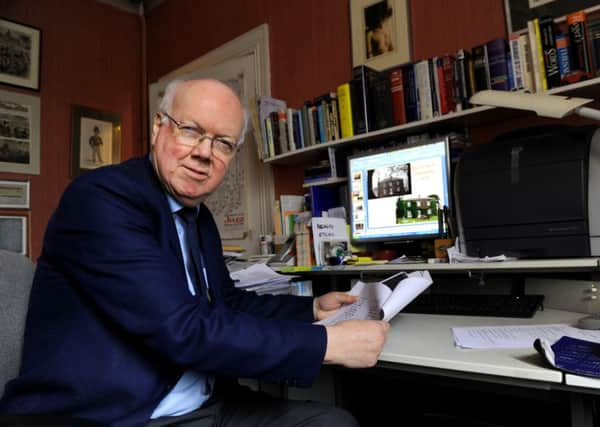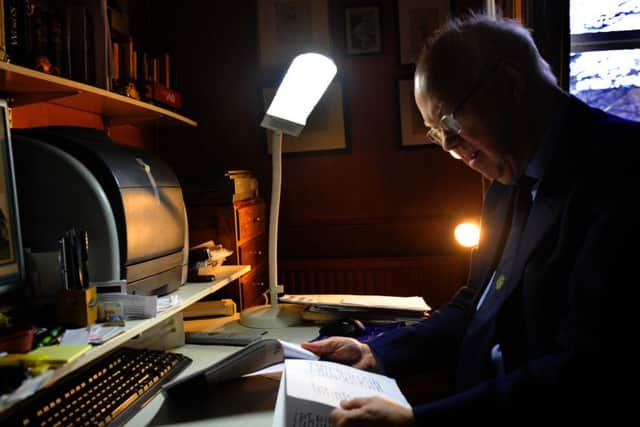Leeds nostalgia: Memoirs of '˜our man' in Cairo, Congo, Russia... and beyond


Listening to Michael Meadowcroft, you’d be forgiven for thinking he was some kind of spy. Either that or a soldier of fortune. As we chat at his house, a Georgian building in the heart of Bramley which still boasts its original front door from 1818, he casually recalls two kidnap attempts in Congo, shady dealings in Russia and trips to literally dozens of other countries. If he were a little taller, younger and possibly more menacing, I swear he’d be in the running to be the next James Bond.
You would think that, at 74, he would have had his fill of the horse-trading that goes hand in hand with politics. But no. He’s only just returned from Egypt, where he was advising their fledgling parliament on how to support its new MPs, 89 of whom are women. And in a few weeks he will publish the 4th edition of The Politics of Electoral Reform.
Advertisement
Hide AdAdvertisement
Hide Ad“I have not stopped. I swapped one form of politics for another.”


Partly, he was in the right place at the right time. After he left politics, he was offered a position with the Policy Studies Institute and then Gorbachev arrived in the Soviet Union and, out of the blue, he was in demand. “You suddenly have all these new republics wanting to know how to run elections. They came to the ERS (Electoral Reform Society, of which he has been a member since 1987) and I was the chair. I’ve been with them for the last 25 years.”
In that time, he’s visited 35 different countries, including Iraq, South Africa, Congo (where he survived two kidnap attempts), Malawi, Zambia, Tanzania, numerous fledgling republics. And he’s been around long enough now to be able to join the dots and see ‘cause and effect’.
“During the elections in Russia in 1996, when Yeltsin was standing, I was there as chief observer. It was a massive job. The authorities there were petrified Gennady Zyuganov [of the Communist Party] would win, and Yeltsin was being kept alive by injections at that point.
Advertisement
Hide AdAdvertisement
Hide Ad“When the results came in, we were finding some polling stations were returning results of 97 per cent in favour of Yeltsin. There were polling stations which did not even exist. It’s very difficult to fiddle polling day but they manipulated the media beforehand.


“The West do not understand that every action has an equal and opposite reaction. Here you had this country with difficult economic circumstances and in particular the West needed to support some sort of Marshall Plan. But it did nothing to help these fledgling Soviet republics. The ruble collapsed at one point. The West should have underpinned it so there was stability. What came out of that was the Russians eventually turned to the one person who could give them their pride back and that was Putin. Russians are very proud of their cultural heritage. When Putin won in 1996, Gorbachev was a candidate and polled 1.7 per cent. We could have helped him but we left him stranded.”
But he has a cautionary message for President Putin: “One of the main tasks of a leader is to find people to follow him or her. Thatcher failed to leave a successor. Putin has to.”
His home, like him, is almost out of a novel - a former mill house dating back almost 200 years which was given a Victorian makeover. It has the quaint appeal of old cottages, floorboards hoary with age, the varnish slightly worn in places, open fires, the smell of woodsmoke, a kitchen festooned with all manner of pots and pans and an adjoining room, bright and airy with a writing desk, piles of papers and shelves crammed full of books and CDs - he also plays in a jazz band, you know.
Advertisement
Hide AdAdvertisement
Hide Ad“I worked in Africa a lot. I was in Cambodia on and off for two years. In the end I had 10,000 employees there. The EU was funding the electoral registration process and I was hired to be in charge of it. I had 10,000 employees doing electoral registration.”
“I had only just arrived in Congo. There are so few Europeans there so I stood out a mile. I was there to look at the elections process but you have to remember it was a temporary compromise government at the time. Suddenly, this car pulled up and some people got out and they wanted to see my papers and were telling me to get into the car.
“I told them to come to the hotel but they said to get in the car. They were pretending to be police officers and I saw the man in the back had a pair of handcuffs at the ready. You get streetwise over the years and what you do is to keep them talking…” Luckily, this is one of his strong points. “I laughed and said I’m frightened and you are not in uniform. When I told him I was a former member of Parliament in the UK, they backed off. It’s lawless in a lot of places, the distances are so vast, everyone has guns. The worst place was so far from the capital, it was like from Leeds to Milan.
“It happened again. The second time I had a mobile phone with me and I bluffed that I would call their boss and asked them for their names.”
Advertisement
Hide AdAdvertisement
Hide AdIn his role as an electoral adviser, he’s been privileged to see the tilt and roll of modern history. So does he think the world is on the right track?
“With the struggle for power and therefore great material wealth, it’s not likely each side is going to play by Marquis of Queensberry rules. Might is power. Mugabe was in prison but while he was there they didn’t allow him to attend his son’s funeral. It’s like the US imprisoning people in Guantanamo Bay for 14 years… how do they expect people to be friendly afterwards? The same is true of drone attacks on people in Syria. It’s not effective in the bigger picture.
“In the end, you have to have a rigorous intellectual basis for opposing regimes. I came to believe through all these missions that the human instinct is to want to take part in one’s own governance. Many times you will have 60 per cent of the electorate waiting for the poll to open outside. The problem is if it’s not based on some kind of philosophy, then it’s doomed.”
Today, he will be at the official unveiling of the new Thoresby Room in The Leeds Library, Commercial Street - a collaboration between the two institutions, which Times Past will be reporting on in due course.